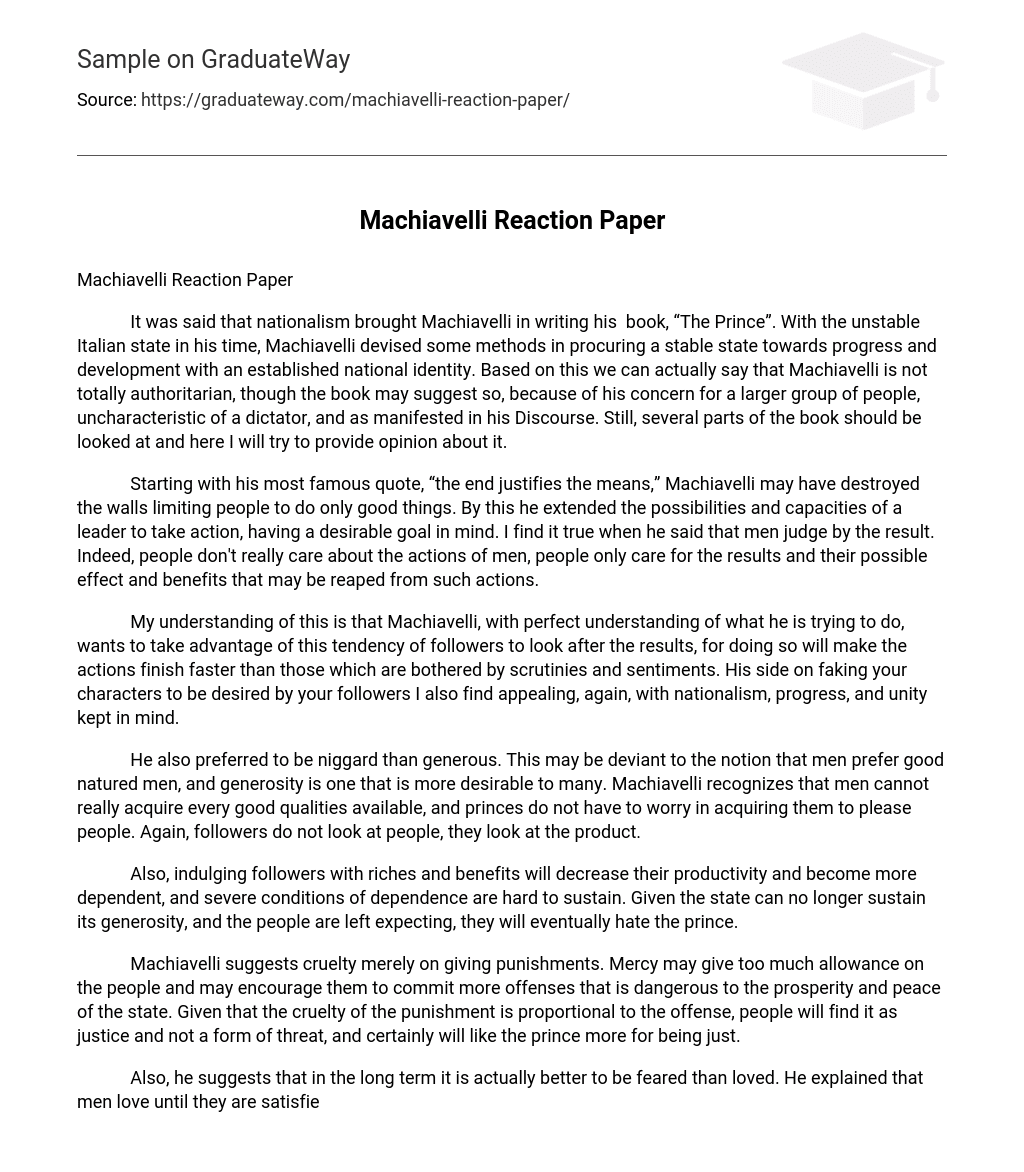It was said that nationalism brought Machiavelli in writing his book, “The Prince”. With the unstable Italian state in his time, Machiavelli devised some methods in procuring a stable state towards progress and development with an established national identity. Based on this we can actually say that Machiavelli is not totally authoritarian, though the book may suggest so, because of his concern for a larger group of people, uncharacteristic of a dictator, and as manifested in his Discourse. Still, several parts of the book should be looked at and here I will try to provide opinion about it.
Starting with his most famous quote, “the end justifies the means,” Machiavelli may have destroyed the walls limiting people to do only good things. By this he extended the possibilities and capacities of a leader to take action, having a desirable goal in mind. I find it true when he said that men judge by the result. Indeed, people don’t really care about the actions of men, people only care for the results and their possible effect and benefits that may be reaped from such actions.
My understanding of this is that Machiavelli, with perfect understanding of what he is trying to do, wants to take advantage of this tendency of followers to look after the results, for doing so will make the actions finish faster than those which are bothered by scrutinies and sentiments. His side on faking your characters to be desired by your followers I also find appealing, again, with nationalism, progress, and unity kept in mind.
He also preferred to be niggard than generous. This may be deviant to the notion that men prefer good natured men, and generosity is one that is more desirable to many. Machiavelli recognizes that men cannot really acquire every good qualities available, and princes do not have to worry in acquiring them to please people. Again, followers do not look at people, they look at the product.
Also, indulging followers with riches and benefits will decrease their productivity and become more dependent, and severe conditions of dependence are hard to sustain. Given the state can no longer sustain its generosity, and the people are left expecting, they will eventually hate the prince.
Machiavelli suggests cruelty merely on giving punishments. Mercy may give too much allowance on the people and may encourage them to commit more offenses that is dangerous to the prosperity and peace of the state. Given that the cruelty of the punishment is proportional to the offense, people will find it as justice and not a form of threat, and certainly will like the prince more for being just.
Also, he suggests that in the long term it is actually better to be feared than loved. He explained that men love until they are satisfied and a prince is in great trouble when people no longer find him desirable, desirable in a way that he gives them their wants. But being feared will last long, truly, because men are always afraid.
However, a prince must avoid being hated, but remain feared. Hatred may result to many undesirable actions by the people, it is either they dethrone him or various bloody conflicts will occur. Certainly, lack of support by the people will make the state fall, for it is through them that the state functions and exists.
I think that his suggestion to disregard old promises is not in accord with his interests, is very undesirable given the extent of its effects and the losses of those who are expecting from him. It is always better not to make promises you can’t keep.
Lastly, being both a fox and lion in character can make the prince the most desirable of princes. The capacity of a fox to avoid traps and sense dangers can save a leader and his state from future disturbances and crises. Since crisis is inevitable and problems are certain to occur, he must also have the strength and tenacity of the lion to face them. Of all his suggestions, this can be considered to be the most common, common even to most ordinary persons, not leaders at all. Being both a lion and fox can help them live well, rally towards their goals easily, and face every challenges and consequences along the way. He sums up, “so it is necessary for a prince to know how to make use of both natures, and that one without the other is not durable.”
Certainly, Machiavelli’s treatise commands good leadership, though not desirable to extremely good people, who have failed themselves being so good. His sole intention is to unite Italy and establish its own identity. That I think is more important than the sentiments of a few, selfish few, who wants to take advantage of the goodness of people, and who wants to abuse power themselves. Most of the time, even though we aren’t all princes, it is necessary to commit bad acts, to correct situations which have been corrupted by being over good. Acts which are leading to good results eventually. Good results that are loved more by people and that can make them forget the evil that was once committed leading to it. People who are sucking to one’s goodness and hating them after he’s drained of everything.
Machiavelli denounces being purely good or purely evil as a prince. His main point in this is that one should be able to be bad and good depending on the necessity of the case. A balance of goodness and evilness will certainly make a state stable, having a large group of people with different characteristics themselves and are capable of many things.
References
Machiavelli, Niccolo. 2003. The Prince. Penguin Classics.





